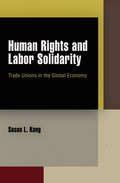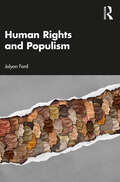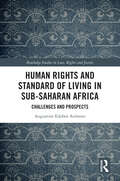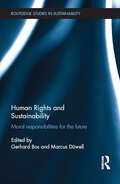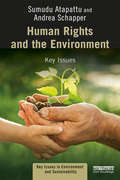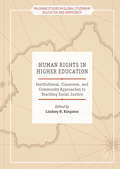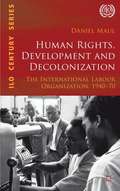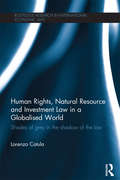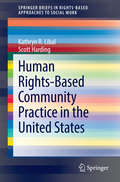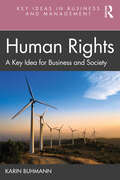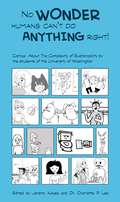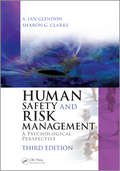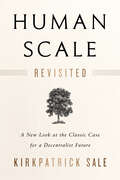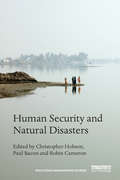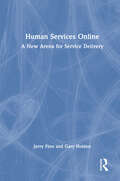- Table View
- List View
Human Rights and Labor Solidarity
by Susan L. KangFaced with the economic pressures of globalization, many countries have sought to curb the fundamental right of workers to join trade unions and engage in collective action. In response, trade unions in developed countries have strategically used their own governments' commitments to human rights as a basis for resistance. Since the protection of human rights remains an important normative principle in global affairs, democratic countries cannot merely ignore their human rights obligations and must balance their international commitments with their desire to remain economically competitive and attractive to investors.Human Rights and Labor Solidarity analyzes trade unions' campaigns to link local labor rights disputes to international human rights frameworks, thereby creating external scrutiny of governments. As a result of these campaigns, states engage in what political scientist Susan L. Kang terms a normative negotiation process, in which governments, trade unions, and international organizations construct and challenge a broader understanding of international labor rights norms to determine whether the conditions underlying these disputes constitute human rights violations. In three empirically rich case studies covering South Korea, the United Kingdom, and Canada, Kang demonstrates that this normative negotiation process was more successful in creating stronger protections for trade unions' rights when such changes complemented a government's other political interests. She finds that states tend not to respect stronger economically oriented human rights obligations due to the normative power of such rights alone. Instead, trade union transnational activism, coupled with sufficient political motivations, such as direct economic costs or strong rule of law obligations, contributed to changes in favor of workers' rights.
Human Rights and Populism
by Jolyon FordFor decades, framing an issue as a ‘human rights’ issue carried certain power and effect in politics and international relations, one that has been challenged by the recent rise of populist political forces. Ford explores the recent impact of populist politics on the universalist human rights project, in particular, how scholars have framed and responded to this challenge. Ford offers a provocation to the human rights movement. Rather than ‘what have populists done to human rights?’, it asks ‘how did we, the human rights movement, do this to ourselves?’ How did fundamental protections for all become so easily scapegoated as ‘us and them,’ as claims of small, often foreign, minorities? Did human rights lose some vital connection to ordinary people’s interests, their value taken as obvious and self-explanatory? Looking forward, the book asks how – in a post-truth ‘fake news’ world – we might reimagine human rights as underpinning human flourishing as well as important constraints on public and private concentrations of power. Traversing relevant scholarly literature on the future of human rights and zooming out to look at wider patterns of political and diplomatic discourse, this book will speak to policymakers, diplomats, journalists, and human rights advocates – and all interested in the crisis of liberal democracies.
Human Rights and Standard of Living in Sub-Saharan Africa: Challenges and Prospects (Routledge Studies in Law, Rights and Justice)
by Augustine Edobor ArimoroThis book offers a comprehensive and nuanced examination of the right to an adequate standard of living in Sub-Saharan Africa (SSA), shedding light on the multifaceted challenges, opportunities, and imperatives for action. The right to an adequate standard of living is a fundamental human right, essential for the dignity and well-being of all individuals. Yet, in SSA, the realisation of this right remains a complex and elusive goal, with millions of people facing poverty, inequality, and limited access to basic services. Through a series of in-depth chapters, the book explores the various dimensions of the right to an adequate standard of living, from the pervasive impacts of poverty and inequality to the critical importance of access to healthcare, education, housing, and justice. Drawing on a rich array of case studies, data, and expert analysis, the work provides a compelling and evidence-based assessment of the current state of affairs in SSA, highlighting the urgent need for comprehensive and context-specific approaches to advancing this fundamental right. Providing a roadmap for promoting sustainable and inclusive development, reducing poverty and inequality, and ensuring access to basic services for all, the volume offers a set of actionable recommendations for policymakers, practitioners, and researchers working in the areas of Human Rights Law, Development Law and, in particular, those focused on the United Nations Sustainable Development Goals. At the same time, it identifies key areas for further research and investigation, underscoring the importance of ongoing knowledge generation and exchange in support of evidence-based policy and practice.
Human Rights and Sustainability: Moral responsibilities for the future (Routledge Studies in Sustainability)
by Gerhard Bos and Marcus DüwellThe history of human rights suggests that individuals should be empowered in their natural, political, political, social and economic vulnerabilities. States within the international arena hold each other responsible for doing just that and support or interfere where necessary. States are to protect these essential human vulnerabilities, even when this is not a matter of self-interest. This function of human rights is recognized in contexts of intervention, genocide, humanitarian aid and development. This book develops the idea of environmental obligations as long-term responsibilities in the context of human rights. It proposes that human rights require recognition that, in the face of unsustainable conduct, future human persons are exposed and vulnerable. It explores the obstacles for long-term responsibilities that human rights law provides at the level of international and national law and challenges the question of whether lifestyle restrictions are enforceable in view of liberties and levels of wellbeing typically seen as protected by human rights. The book will be of interest to postgraduates studying Human Rights, Sustainability, Law and Philosophy.
Human Rights and World Trade: Hunger in International Society (New International Relations)
by Ana Gonzalez-PelaezA new and incisive analysis of the political viability of human rights, with an in-depth investigation of its largest violation: world hunger. Gonzalez-Pelaez develops John Vincent's theory of basic human rights within the context of the international political economy and demonstrates how the right to food has become an international norm enshrined within international law. She then assesses the international normative and practical dimensions of hunger in connection with international trade and poverty. Using the society of states as the framework of analysis, she explores the potential that the current system has to correct its own anomalies, and examines the measures that can move the hunger agenda forward in order to break through its current stagnation.
Human Rights and the Environment: Key Issues (Key Issues in Environment and Sustainability)
by Sumudu Atapattu Andrea SchapperThe field of human rights and the environment has grown phenomenally during the last few years and this textbook will be one of the first to encourage students to think critically about how many environmental issues lead to a violation of existing rights. Taking a socio-legal approach, this book will provide a good understanding of both human rights and environmental issues, as well as the limitations of each regime, and will explore the ways in which human rights law and institutions can be used to obtain relief for the victims of environmental degradation or of adverse effects of environmental policies. In addition, it will place an emphasis on climate change and climate policies to highlight the pros and cons of using a human rights framework and to underscore its importance in the context of climate change. As well as identifying emerging issues and areas for further research, each chapter will be rich in pedagogical features, including web links to further research and discussion questions for beyond the classroom. Combining their specialisms in law and politics, Atapattu and Schapper have developed a truly inter-disciplinary resource that will be essential for students of human rights, environmental studies, international law, international relations, politics, and philosophy.
Human Rights and the Hollow State: Human Rights And The Hollow State (Routledge Research in Human Rights)
by Helen J. DelfeldThe book investigates the beliefs about governance that determine that state structures are the most appropriate venue for international human rights actors and activists to operate. Helen Delfeld argues that those beliefs rely on a normative perception of a nation-state, not necessarily applicable to most of the post-colonial world. While most post-colonial states may appear to demonstrate the trappings of modern nation-statehood, these projects are mostly spurred by and benefit an elite class. At the same time, there may be little identification with their government among the grassroots polity. Delfeld focuses on the Philippines as an example of a post-colonial state, using nested case studies to show how people think differently about the state at different scales. Following a two-pronged approach, she investigates key moments of state action or inaction, and then asks people at the grassroots about their perspectives on governance, their engagement with the state, and their views of human rights. Her findings indicate that people at the grassroots rely on alternative forms of governance, often in the form of NGOs, INGOs, local cooperatives, informal networks, or structures that pre-date both colonization and independence. Her research also indicates the possibility that some of the most effective human rights actors do not rely on the state, as demonstrated by comparing locally-generated campaigns aimed at promoting environmental rights with state campaigns that address violence against women. The Hollow State and Human Rights shows that rights initiatives misdirected through a "hollow state" might strengthen the mechanisms of the state, but might not actually create a more attentive nation-state. Human rights activists and actors may be far more effective by accessing local structures directly, the practical implications of which go beyond the Philippines to other post-colonial states.
Human Rights from Below
by Jim IfeIn Human Rights From Below, Jim Ife shows how human rights and community development are problematic terms but powerful ideals, and that each is essential for understanding and practising the other. Ife contests that practitioners - advocates, activists, workers and volunteers - can better empower and protect communities when human rights are treated as more than just a specialist branch of law or international relations, and that human rights can be better realised when community development principles are applied. The book offers a long overdue assessment of how human rights and community development are invariably interconnected. It highlights how critical it is to understand the two as a basis for thinking about and taking action to address the serious challenges facing the world in the twenty-first century. Written both for students and for community development and human rights workers, Human Rights From Below brings together the important fields of human rights and community development, to enrich our thinking of both.
Human Rights in Business: Removal of Barriers to Access to Justice in the European Union
by Katerina Yiannibas Juan José Álvarez RubioThe capacity to abuse, or in general affect the enjoyment of human, labour and environmental rights has risen with the increased social and economic power that multinational companies wield in the global economy. At the same time, it appears that it is difficult to regulate the activities of multinational companies in such a way that they conform to international human, labour and environmental rights standards. This has partially to do with the organization of companies into groups of separate legal persons, incorporated in different states, as well as with the complexity of the corporate supply chain. Absent a business and human rights treaty, a more coherent legal and policy approach is required. Faced with the challenge of how to effectively access the right to remedy in the European Union for human rights abuses committed by EU companies in non-EU states, a diverse research consortium of academic and legal institutions was formed. The consortium, coordinated by the Globernance Institute for Democratic Governance, became the recipient of a 2013 Civil Justice Action Grant from the European Commission Directorate General for Justice. A mandate was thus issued for research, training and dissemination so as to bring visibility to the challenge posed and moreover, to provide some solutions for the removal of barriers to judicial and non-judicial remedy for victims of business-related human rights abuses in non-EU states. The project commenced in September 2014 and over the course of two years the consortium conducted research along four specific lines in parallel with various training sessions across EU Member States. The research conducted focused primarily on judicial remedies, both jurisdictional barriers and applicable law barriers; non-judicial remedies, both to company-based grievance. The results of this research endeavour make up the content of this report whose aim is to provide a scholarly foundation for policy proposals by identifying specific challenges relevant to access to justice in the European Union and to provide recommendations on how to remove legal and practical barriers so as to provide access to remedy for victims of business-related human rights abuses in non-EU states.
Human Rights in Higher Education: Institutional, Classroom, And Community Approaches To Teaching Social Justice (Palgrave Studies In Global Citizenship Education And Democracy Ser.)
by Lindsey N. KingstonThis book focuses on human rights education (HRE) in higher education, with an emphasis on supporting undergraduate education for social justice and global citizenship at the institutional, classroom, and community levels. Drawing from the work of human rights scholars and advocates at Webster University, Kingston begins a critical discussion about the potential of HRE on college campuses and beyond. Chapter contributors address the institutional issues inherent to building a “human rights campus,” promoting just governance models, facilitating student research, and fostering inclusive campus communities. They further explore opportunities within the classroom by highlighting dynamic courses on global sustainable development and post-genocide reconciliation, as well as considering how to create trauma sensitive learning spaces and utilize photography as a human rights teaching tool. Finally, scholar-advocates detail how HRE can be expanded to include the broader community—including teaching critical criminology to aspiring police officers, facilitating community dialogue through academic conferences, and engaging in social justice work related to access to justice, domestic violence, and human trafficking.
Human Rights in Japan, South Korea and Taiwan (Routledge Advances in Asia-Pacific Studies)
by Ian NearyIan Neary looks in detail at the history of the introduction of human rights ideas into Japan, South Korea and Taiwan and examines how, and to what effect, state and society have incorporated the specific international standards on childrens' and patients' rights into legal systems and social practice. This comprehensively researched, accessibly written book will be a valuable resource for students and scholars of Asian studies, human rights, sociology and politics.
Human Rights in the Extractive Industries: Transparency, Participation, Resistance (Interdisciplinary Studies in Human Rights #3)
by Isabel Feichtner Markus Krajewski Ricarda RoeschThis book addresses key challenges and conflicts arising in extractive industries (mining, oil drilling) concerning the human rights of workers, their families, local communities and other stakeholders. Further, it analyses various instruments that have sought to mitigate human rights violations by defining transparency-related obligations and participation rights. These include the Extractive Industries Transparency Initiative (EITI), disclosure requirements, and free, prior and informed consent (FPIC). The book critically assesses these instruments, demonstrating that, in some cases, they produce unwanted effects. Furthermore, it highlights the importance of resistance to extractive industry projects as a response to human rights violations, and discusses how transparency, participation and resistance are interconnected.
Human Rights, Development and Decolonization
by Daniel MaulAn innovative diplomatic and intellectual history of decolonization, post-colonial nation building and international human rights and development discourses, this study of the role of the ILO during 1940-70 opens up new perspectives on the significance of international organisations as actors in the history of the 20th century.
Human Rights, Natural Resource and Investment Law in a Globalised World: Shades of Grey in the Shadow of the Law (Routledge Research in International Economic Law)
by Lorenzo CotulaIn the world’s developing countries, foreign investment in natural resources brings into contact competing interests that are often characterised by unequal balances of negotiating power – from multinational corporations and host governments, through to the local people affected by the influx of foreign investment. The growing integration of the world economy has been accompanied by rapid and extensive developments in the national and international norms that regulate investment and its impact – including investment law, natural resource law and human rights law. These legal developments affect the ‘shadow’ that the law casts over the multiple negotiations that characterise international investment projects in the developing world. Drawing on international law, the national law of selected jurisdictions and the contracts concluded in a large investment project, Human Rights, Natural Resource and Investment Law in a Globalised World explores the ways in which the law protects the varied property rights that are at play in foreign investment projects in developing countries, with a focus on Africa. Through an integrated analysis of seemingly disparate fields of law, this book sheds new light on how the law mediates the competing interests that come into contact as a result of economic globalisation, whilst also providing new insights on the changing nature of state sovereignty and on the relationship between law and power in a globalised world. This book will be of interest to scholars, students and informed practitioners working in the fields of international investment and human rights law, comparative law, socio-legal studies, and development studies.
Human Rights-Based Community Practice in the United States
by Kathryn R. Libal Scott HardingA transformative model for community social work rooted in basic social and economic rights is the basis of this timely Brief. With specific chapters spotlighting the rights to health care, nutritious food, and adequate and affordable housing, the book describes in depth the role of community practice in securing rights for underserved and vulnerable groups and models key aspects of rights-based work such as empowerment, participation, and collaboration. Case examples relate local struggles to larger regional and statewide campaigns, illustrating ways the book's framework can inform policymakers and improve social structures in the larger community. This rights-based perspective contrasts sharply with the deficits-based approach commonly employed in community social work, and has the potential to inspire new strategies for addressing systemic social inequality. Features of Human Rights-Based Community Practice in the United States: A conceptual basis for a rights-based approach to community practice. Detailed analysis of legal and social barriers to health care, housing, and food. Examples of effective and emerging rights-based community interventions. Methods for assessing the state of human rights at the community level. Documents, discussion questions, resource lists, and other valuable tools.
Human Rights: A Key Idea for Business and Society (Key Ideas in Business and Management)
by Karin BuhmannHuman rights is an interdisciplinary subject as well as a foundational aspect of the law. The importance of human rights at the intersection of business and society is central, yet under-analyzed. This book provides an accessible understanding of what human rights are, how business enterprises may impact human rights for better or for worse, and how such impacts can or should be managed. Human Rights: A Key Idea for Business and Society equips readers interested in the relationship between business and society with the foundational knowledge for engaging in debates and operational tasks related to the roles and responsibilities of business with regard to human rights. It covers human rights aspects relevant to common management tasks, including supply chain management, human resource management, risk management, non-financial reporting, finance, and stakeholder engagement. It covers opportunities and challenges related to the Sustainable Development Goals (SDGs) and climate change mitigation. The book explains the foundations for human rights, social expectations, and legal requirements on businesses to respect human rights and how business enterprises should identify and manage their human rights impacts. A concise introduction to a complex topic, this book is perfect reading for students of corporate social responsibility, business ethics, and international business, as well as an illuminating guide for researchers, managers, civil society organizations, government officials, and reflective practitioners.
Human Rights: Comics About The Complexity Of Sustainability
by Reshmaan N. Hussam Grace Liu<P><P> <i>Advisory: Bookshare has learned that this book offers only partial accessibility. We have kept it in the collection because it is useful for some of our members. Benetech is actively working on projects to improve accessibility issues such as these.</i>
Human Safety and Risk Management: A Psychological Perspective, Third Edition
by Sharon Clarke A. Ian GlendonThe third edition of a bestseller, Human Safety and Risk Management: A Psychological Perspective incorporates a decade of new research and development to provide you with a comprehensive and contemporary guide to the psychology of risk and workplace safety. A major enhancement is reflected in the new subtitle for the book, A Psychological Perspective, which highlights both the expertise of the authors and also confirms the predominantly psychological orientation of the revised text.New in the Third Edition: State-of-the-art theory reviews, research findings, and practical applications New chapter on impact that sensor technologies have on approaches to safety and risk in contemporary society Enhanced chapters on key issues around sensing danger, risk perception, error detection, safety culture, risk management, leadership, teams, and stress management This book discusses how people perceive and manage risks and how to make the workplace a safer place. It examines the influence of individual factors on safety, as well as team and organizational factors at work, from a psychological perspective. It also highlights changes in safety due to the changing workplace, globalization, and managing employees’ safety and health beyond the workplace — a challenge that many organizations have yet to address. Reflecting current scientific research across a range of disciplines as it applies to human safety and risk management, this book helps you meet the challenges posed by the rapidly evolving workplace.
Human Scale Revisited: A New Look at the Classic Case for a Decentralist Future
by Kirkpatrick SaleBig government, big business, big everything: Kirkpatrick Sale took giantism to task in his 1980 classic, Human Scale, and today takes a new look at how the crises that imperil modern America are the inevitable result of bigness grown out of control—and what can be done about it.The result is a keenly updated, carefully argued case for bringing human endeavors back to scales we can comprehend and manage—whether in our built environments, our politics, our business endeavors, our energy plans, or our mobility.Sale walks readers back through history to a time when buildings were scaled to the human figure (as was the Parthenon), democracies were scaled to the societies they served, and enterprise was scaled to communities. Against that backdrop, he dissects the bigger-is-better paradigm that has defined modern times and brought civilization to a crisis point. Says Sale, retreating from our calamity will take rebalancing our relationship to the environment; adopting more human-scale technologies; right-sizing our buildings, communities, and cities; and bringing our critical services—from energy, food, and garbage collection to transportation, health, and education—back to human scale as well.Like Small is Beautiful by E. F. Schumacher, Human Scale has long been a classic of modern decentralist thought and communitarian values—a key tool in the kit of those trying to localize, create meaningful governance in bioregions, or rethink our reverence of and dependence on growth, financially and otherwise.Rewritten to interpret the past few decades, Human Scale offers compelling new insights on how to turn away from the giantism that has caused escalating ecological distress and inequality, dysfunctional governments, and unending warfare and shines a light on many possible pathways that could allow us to scale down, survive, and thrive.
Human Sciences and Human Interests: Integrating the Social, Economic, and Evolutionary Sciences (Routledge Advances in Sociology)
by Mikael KlintmanWithin the disciplines of social, economic, and evolutionary science, a proud ignorance can often be found of the other areas’ approaches. This text provides a novel intellectual basis for breaking this trend. Certainly, Human Sciences and Human Interests aspires to open a broad debate about what scholars in the different human sciences assume, imply or explicitly claim with regard to human interests. Mikael Klintman draws the reader to the core of human sciences - how they conceive human interests, as well as how interests embedded within each discipline relate to its claims and recommendations. Moreover, by comparing theories as well as concrete examples of research on health and environment through the lenses of social, economic and evolutionary sciences, Klintman outlines an integrative framework for how human interests could be better analysed across all human sciences. This fast-paced and modern contribution to the field is a necessary tool for developing any human scientist’s ability to address multidimensional problems within a rapidly changing society. Avoiding dogmatic reasoning, this interdisciplinary text offers new insights and will be especially relevant to scholars and advanced students within the aforementioned disciplines, as well as those within the fields of social work, social policy, political science and other neighbouring disciplines.
Human Sciences and Human Interests: Integrating the Social, Economic, and Evolutionary Sciences (Routledge Advances in Sociology)
by Mikael KlintmanWithin the disciplines of social, economic, and evolutionary science, a proud ignorance can often be found of the other areas’ approaches. This text provides a novel intellectual basis for breaking this trend. Certainly, Human Sciences and Human Interests aspires to open a broad debate about what scholars in the different human sciences assume, imply or explicitly claim with regard to human interests.Mikael Klintman draws the reader to the core of human sciences - how they conceive human interests, as well as how interests embedded within each discipline relate to its claims and recommendations. Moreover, by comparing theories as well as concrete examples of research on health and environment through the lenses of social, economic and evolutionary sciences, Klintman outlines an integrative framework for how human interests could be better analysed across all human sciences.This fast-paced and modern contribution to the field is a necessary tool for developing any human scientist’s ability to address multidimensional problems within a rapidly changing society. Avoiding dogmatic reasoning, this interdisciplinary text offers new insights and will be especially relevant to scholars and advanced students within the aforementioned disciplines, as well as those within the fields of social work, social policy, political science and other neighbouring disciplines.
Human Security and Japan's Triple Disaster: Responding to the 2011 earthquake, tsunami and Fukushima nuclear crisis (Routledge Humanitarian Studies)
by Paul Bacon Christopher HobsonJapan has been one of the most important international sponsors of human security, yet the concept has hitherto not been considered relevant to the Japanese domestic context. This book applies the human security approach to the specific case of the earthquake, tsunami and nuclear accident that struck Japan on 11 March 2011, which has come to be known as Japan's ‘triple disaster’. This left more than 15,000 people dead and was the most expensive natural disaster in recorded history. The book identifies the many different forms of human insecurity that were produced or exacerbated within Japan by the triple disaster. Each chapter adds to the contemporary literature by identifying the vulnerability of Japanese social groups and communities, and examining how they collectively seek to prevent, respond to and recover from disaster. Emphasis is given to analysis of the more encouraging signs of human empowerment that have occurred. Contributors draw on a wide range of perspectives, from disciplines such as: disaster studies, environmental studies, gender studies, international relations, Japanese studies, philosophy and sociology. In considering this Japanese case study in detail, the book demonstrates to researchers, postgraduate students, policy makers and practitioners how the concept of human security can be practically applied at a policy level to the domestic affairs of developed countries, countering the tendency to regard human security as exclusively for developing states.
Human Security and Natural Disasters (Routledge Humanitarian Studies)
by Christopher Hobson, Paul Bacon and Robin Cameron"Human security" is an approach that rejects the traditional prioritization of state security, and instead identifies the individual as the primary referent of security. It offers a way of broadening our perspective, and recognizing that the most pressing threats to individuals do not come from interstate war, but from the emergencies that affect people every day, such as famine, disease, displacement, civil conflict and environmental degradation. Human security is about people living their lives with dignity, being free from "fear" and "want". To date, there has been a strong tendency to focus on insecurity caused by civil conflict, with less attention on issues to do with environmental security. This volume addresses the threat posed by natural disasters, which represent an increasingly major human security threat to people everywhere. In looking at natural disasters, this book also refines the human security approach. It does so through developing its previously unexplored interdisciplinary potential. This volume explicitly seeks to bring the human security approach into conversation with contributions from a range of disciplines: development, disaster sociology, gender studies, international law, international relations, philosophy, and public health. Collectively these scholars unpack the "human" element of "natural" disasters. In doing so, an emphasis is placed on how pre-existing vulnerabilities can be gravely worsened, as well as the interconnected nature of human security threats. The book presents a variety of case studies that include the Indian Ocean tsunami, Hurricane Katrina, the 2010 Haiti earthquake, and the 2011 "triple disasters" in Japan.
Human Security and Non-Citizens: Law, Policy and International Affairs
by Alice Edwards Carla FerstmanThe past decades have seen enormous changes in our perceptions of 'security', the causes of insecurity and the measures adopted to address them. Threats of terrorism and the impacts of globalisation and mass migration have shaped our identities, politics and world views. This volume of essays analyses these shifts in thinking and, in particular, critically engages with the concept of 'human security' from legal, international relations and human rights perspectives. Contributors consider the special circumstances of non-citizens, such as refugees, migrants, and displaced and stateless persons, and assess whether, conceptually and practically, 'human security' helps to address the multiple challenges they face.
Human Services Online: A New Arena for Service Delivery
by Gary Holden Jerry FinnWill your agency or students have the training to use the Internet in practice?Human Services Online: A New Arena for Service Delivery focuses on ways that Human Services are using the Internet for service delivery, community education, collaboration, advocacy, social change, and resource development. This valuable book highlights the array of innovative services now being offered on the Internet and provides guidelines and cautions for human service professionals in using the Internet to enhance their services.Human Services Online: A New Arena for Service Delivery provides much-needed research and empirical evaluation related to human service online activities and points to areas where future research efforts should be directed. The book describes and evaluates cutting-edge Internet-based services, ethical and legal threats to agencies and consumers that may result from online activities, and theoretical discussions of issues that impact human services as consumers and human service agencies increasingly come online.Topics addressed in Human Services Online: A New Arena for Service Delivery include: online therapy/counseling online fundraising online recruitment of volunteers and virtual volunteer programs online consultation, continuing education, and training ethical, legal, and liability issues related to Web sites and online support online support groups and self-help online advocacy and activism promoting access for under-represented populations use of the Internet to impact specific social problems such as domestic violence or HIV/AIDS Human Services Online: A New Arena for Service Delivery provides guidelines and specific suggestions for agencies considering developing online services. The book examines model programs and their effectiveness so that other agencies can replicate them in their own areas, describes cutting-edge online services that today's human services students will need to be aware of as they enter the job market, and provides information for agencies that will enhance their ability to solicit volunteers and contributions on the Internet.
